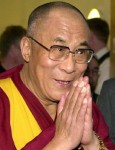Hilarious line from an anti-gay marriage rally in North Carolina earlier this year,
David Gibbs III, a lawyer who in 2005 fought to keep brain-damaged Terri Schiavo on life support, told rally participants gay marriage would “open the door to unusual marriage in North Carolina.”
“Why not polygamy, or three or four spouses?” Gibbs asked. “Maybe people will want to marry their pets or robots.”
Providing it is among consensual adults (and dual core processors) there’s nothing wrong in principle with multiple spouses or marriages to robots (I do agree on the pets issue, but I’m not sure how Gibbs gets from consensual marriage among consenting adults to marriages involving animals with clearly extremely diminished mental faculties).
Personally, though, I think people will probably prefer to simply have sex with robots rather than marrying them. For those curious, David Levy wrote a fascinating book about future human-machine relationships Love and Sex with Robots.
Certainly in a world where Gibbs himself argues for a right to have life preserved by artificial means, why not a world where we have a right to love by artificial means?
 Back in November, the Dalai Lama decided to
Back in November, the Dalai Lama decided to